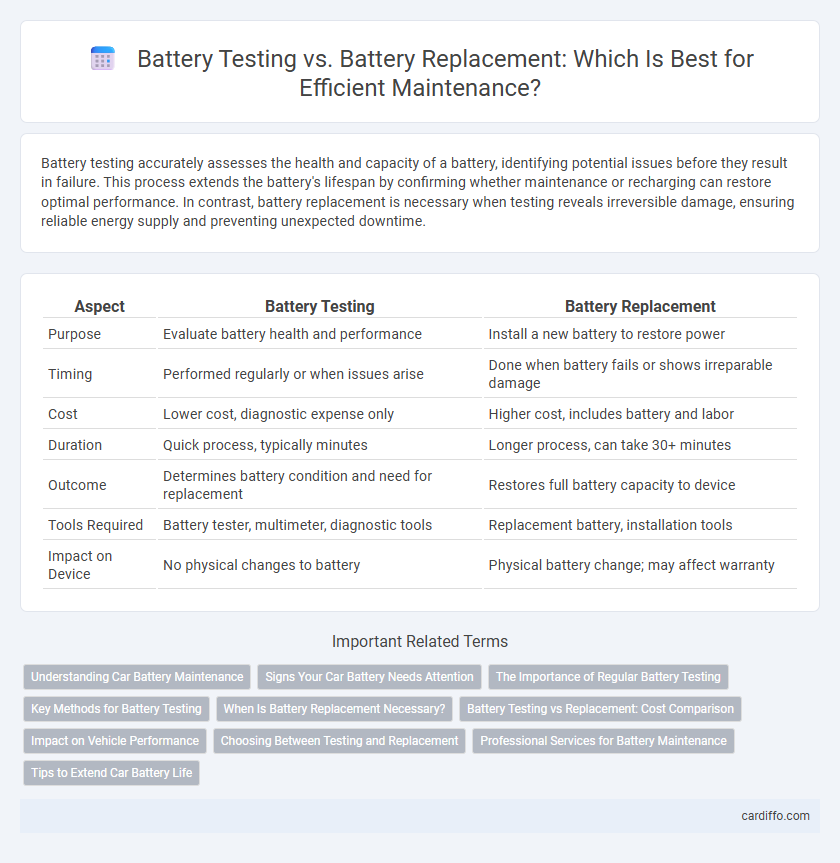Battery testing accurately assesses the health and capacity of a battery, identifying potential issues before they result in failure. This process extends the battery's lifespan by confirming whether maintenance or recharging can restore optimal performance. In contrast, battery replacement is necessary when testing reveals irreversible damage, ensuring reliable energy supply and preventing unexpected downtime.
Table of Comparison
| Aspect | Battery Testing | Battery Replacement |
|---|---|---|
| Purpose | Evaluate battery health and performance | Install a new battery to restore power |
| Timing | Performed regularly or when issues arise | Done when battery fails or shows irreparable damage |
| Cost | Lower cost, diagnostic expense only | Higher cost, includes battery and labor |
| Duration | Quick process, typically minutes | Longer process, can take 30+ minutes |
| Outcome | Determines battery condition and need for replacement | Restores full battery capacity to device |
| Tools Required | Battery tester, multimeter, diagnostic tools | Replacement battery, installation tools |
| Impact on Device | No physical changes to battery | Physical battery change; may affect warranty |
Understanding Car Battery Maintenance
Regular battery testing identifies voltage levels and potential issues, ensuring optimal car battery performance and preventing unexpected failures. Understanding the difference between testing and replacement helps maintain battery health, as testing extends battery life by detecting early signs of wear while replacement restores full function when capacity falls below operational thresholds. Proper car battery maintenance reduces maintenance costs and improves vehicle reliability by balancing timely testing with appropriate replacement schedules.
Signs Your Car Battery Needs Attention
Corroded battery terminals, slow engine crank, and dim headlights are key indicators that your car battery needs testing or replacement. Regular battery testing using a voltmeter or load tester can pinpoint declining performance before complete failure occurs. Prompt battery replacement prevents unexpected breakdowns and ensures reliable vehicle operation.
The Importance of Regular Battery Testing
Regular battery testing is crucial for preventing unexpected failures and extending battery lifespan by identifying potential issues early. Battery testing measures key performance indicators such as voltage, capacity, and internal resistance to ensure reliable operation. Timely testing reduces the cost of battery replacement by enabling maintenance before complete battery deterioration occurs.
Key Methods for Battery Testing
Battery testing employs key methods such as load testing, voltage testing, and impedance measurement to accurately assess a battery's health and performance. Load testing simulates actual operating conditions by applying a controlled load to determine the battery's ability to hold voltage under stress. Impedance measurement evaluates internal resistance, providing insights into battery deterioration and predicting potential failures before deciding on battery replacement.
When Is Battery Replacement Necessary?
Battery replacement becomes necessary when battery testing reveals significant capacity loss, voltage drops below manufacturer specifications, or frequent failure to hold a charge. Regular battery testing can pinpoint reduced performance indicators, such as increased internal resistance or slow recharge rates, signaling the end of the battery's effective lifespan. Ignoring these signs risks equipment downtime and potential safety hazards, making timely replacement essential for reliable operation.
Battery Testing vs Replacement: Cost Comparison
Battery testing offers a cost-effective solution by diagnosing the state of charge and health of a battery, preventing unnecessary expenses on premature battery replacement. Replacing batteries involves higher upfront costs, including the price of the new battery and labor, which can be avoided through regular testing protocols. Efficient battery testing extends battery lifespan, reducing maintenance budgets and minimizing downtime expenses associated with frequent replacements.
Impact on Vehicle Performance
Battery testing accurately assesses the state of charge, capacity, and overall health, preventing unexpected failures and ensuring optimal vehicle performance. Timely battery replacement restores voltage stability and reliable power delivery, directly improving engine starting and electronic system functionality. Neglecting testing or delaying replacement can lead to diminished acceleration, inconsistent electronic operation, and increased risk of vehicle breakdown.
Choosing Between Testing and Replacement
Choosing between battery testing and battery replacement depends on the battery's performance metrics and age. Accurate battery testing identifies issues such as voltage drop, capacity loss, and internal resistance, enabling informed decisions about extending battery life or opting for replacement. Prioritizing diagnostic data from advanced battery analyzers ensures maintenance efficiency and cost savings by avoiding premature replacement or unexpected failures.
Professional Services for Battery Maintenance
Professional battery testing services utilize advanced diagnostic tools to accurately assess battery health, capacity, and potential failure risks, ensuring precise maintenance decisions. Skilled technicians perform thorough evaluations that prevent premature battery replacements, optimizing equipment reliability and reducing operational costs. When battery replacement is necessary, professionals ensure the use of compatible, high-quality batteries and proper installation techniques to maximize performance and longevity.
Tips to Extend Car Battery Life
Regularly testing your car battery with a digital tester helps detect weak cells early, preventing unexpected failures. Maintaining clean battery terminals and ensuring secure connections optimize electrical flow and prolong battery performance. Minimizing short trips and avoiding leaving electronics on when the engine is off reduce battery strain, extending overall battery life before replacement becomes necessary.
Battery Testing vs Battery Replacement Infographic

 cardiffo.com
cardiffo.com